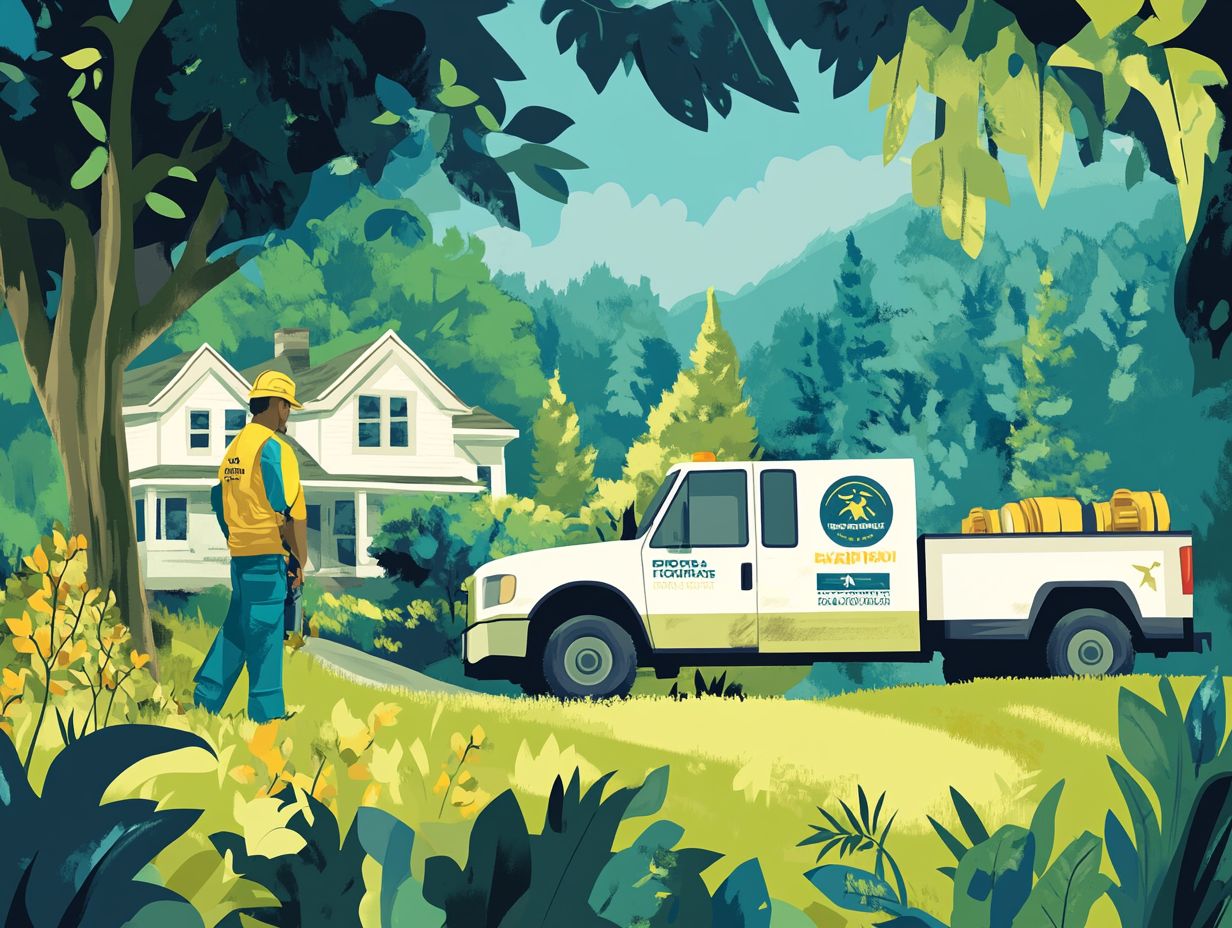In today’s competitive landscape, effective pest control marketing is essential for you if you want your business to thrive and attract customers.
This article dives into the benefits of having a solid marketing strategy specifically designed for the pest control industry. You’ll learn how to identify your target audience and select the most effective marketing channels to boost your outreach efforts.
We’ll also cover techniques, common pitfalls to avoid, and ways to measure your marketing success. Whether you’re a seasoned pro or just starting out, this guide is here to equip you with the insights you need to enhance your pest control business’s visibility and engage with customers.
Why is Pest Control Marketing Important?

Pest control marketing is super important for your Washington pest control business. It boosts your visibility in local markets and helps establish your brand as a trusted provider of pest management services.
With the right marketing strategies, you can set your services apart from the competition, attract new customers, and enhance your overall online reputation. By using various digital marketing techniques like local SEO and social media marketing, you can connect with a broader audience, engage potential clients, and ultimately drive sales, ensuring your business stands strong in a competitive landscape.
What Are the Benefits of Pest Control Marketing?
The benefits of pest control marketing are pretty impressive. You can boost lead generation and enhance your online presence by effectively using customer reviews and tailoring service differentiation strategies to match consumer behavior in the pest control industry.
By harnessing targeted online advertising and search engine optimization techniques, your pest control business can attract potential customers who are actively looking for solutions. This proactive approach not only ramps up your visibility but also builds credibility through genuine customer experiences shared in reviews.
When satisfied clients start spreading positive word-of-mouth, it opens the door to higher conversion rates and repeat business. Plus, engaging with your community on social media helps nurture those relationships, showcasing your dedication to service excellence.
A solid marketing strategy is key for sustained growth and staying ahead in the competitive pest control market.
How to Create a Successful Pest Control Marketing Strategy?
Creating a successful pest control marketing strategy involves a few key steps that really focus on understanding the market, figuring out who your target audience is, and putting effective SEO for pest control into action.
By using marketing analytics and competitive positioning, you can develop a tailored approach that not only draws in new clients but also keeps them coming back with smart customer acquisition methods.
What Are the Key Elements of a Pest Control Marketing Plan?
Your pest control marketing plan should include a variety of key elements, like service pricing, online scheduling options, and the clever use of marketing funnels to guide potential customers through their journey. Don't forget to leverage CRM tools for better customer relationship management.
These components all work together to create a smooth experience for prospective clients, making sure they get the timely information and support they need. For example, having competitive service pricing grabs attention, while online scheduling adds that much-appreciated convenience, letting clients book pest control services without any hassle.
Marketing funnels are essential for nurturing leads, delivering tailored content that speaks directly to their needs. Plus, effective CRM tools enhance communication, enabling you to follow up on inquiries and build strong relationships. All of this contributes to happier customers and increased loyalty in the long run.
How to Identify Your Target Audience for Pest Control Marketing?
Identifying your target audience for pest control marketing is crucial for creating effective campaigns. It involves analyzing demographic data and understanding consumer behavior so you can better meet the needs of potential clients in specific areas.
To really engage with potential customers, you need to dig into various factors like age, gender, income level, and even lifestyle preferences. For example, knowing where your audience lives can give you valuable insights into the specific pest issues they might face, which allows you to tailor your marketing efforts accordingly. By combining these demographic insights with geographic data, you can spot trends, seasonal needs, and common infestations in particular regions.
When you focus on client preferences, you can craft personalized messages that resonate more deeply. This approach ultimately helps you build stronger relationships and boosts your conversion rates.
What Are the Best Marketing Channels for Pest Control Businesses?
The best marketing channels for your pest control business are all about mixing it up with a variety of digital marketing tactics, social media campaigns, and targeted advertising through Google Ads and PPC. Each of these strategies is designed to effectively reach your potential clients.
In terms of digital marketing, content creation and SEO are your best friends. They help you establish authority in the industry and attract organic traffic with informative blog posts or guides. Social media platforms like Facebook and Instagram give you a great space to engage with your community. You can showcase successful pest removal stories and even run promotions to enhance your brand visibility.
On the flip side, targeted Google Ads can put you right at the top of search results when potential customers need you most, allowing you to tap into those high-intent leads. Each marketing channel has its perks, like real-time engagement on social media, but they can also come with challenges, such as the need for consistent content generation and the potential for high costs in PPC campaigns.
Finding the right balance among these approaches can really help your pest control company connect effectively with your audience.
What Are the Most Effective Pest Control Marketing Techniques?
When you think about effective pest control marketing techniques, consider mixing SEO, PPC advertising, and content marketing together.
Adding in some innovative methods like video marketing can really elevate your business's visibility and engage your clients like never before.
1. Search Engine Optimization (SEO)

SEO for pest control is key to boosting your organic search rankings, and it calls for a strategic approach to optimizing your website and doing keyword research specifically for the pest control industry.
When you roll out effective SEO strategies, you can really amp up your online visibility, making it easy for potential customers to discover your services when they’re searching for solutions to pest problems. A big part of this is diving into thorough keyword research to pinpoint the terms your customers are using, which can guide your content creation. Combine that with on-page optimization techniques—like fine-tuning your title tags, headings, and meta descriptions—and you’re not just improving your search engine rankings; you’re also attracting more relevant traffic.
Having a solid presence in organic search boosts your credibility too. People tend to trust businesses that show up at the top of search results, which can lead to higher conversion rates for you.
2. Pay-Per-Click (PPC) Advertising
PPC advertising, especially on platforms like Google Ads, can really be a game-changer for your pest control business. It offers targeted advertising solutions that can boost your conversion rates and generate quality leads.
When you utilize PPC, you can reach potential customers right when they’re searching for pest control services, making sure your ads land in front of the right audience. Plus, you get to set specific budgets, which gives you financial flexibility. This way, you can allocate your resources wisely without breaking the bank.
Effective campaign strategies, like doing thorough keyword research and optimizing your ad copy, are crucial for attracting those clicks. By consistently analyzing performance metrics—like click-through rates and conversion data—you can fine-tune your campaigns. This leads to improved ROI and helps you maintain growth in a competitive market.
3. Social Media Marketing
Social media marketing offers you a fantastic chance to connect with your local community, build customer loyalty, and keep an eye on engagement metrics that show how well your campaigns are working.
By making the most of platforms like Facebook, Instagram, and Twitter, you can promote your services while also creating a sense of community among your customers, encouraging them to share their experiences and concerns.
This two-way interaction is crucial because it lets you respond to inquiries, share helpful tips about pest prevention, and tackle any local issues that pop up.
Keeping track of engagement metrics like likes, shares, and comments gives you the insight you need to see which strategies really hit home with your audience, leading to more effective marketing and better customer relationships over time.
4. Email Marketing
Email marketing can be a game changer for pest control businesses, giving you the chance to connect directly with your clients through email newsletters and personalized promotions that really capture their feedback.
By tapping into this powerful tool, you can effectively engage your audience, addressing their concerns and offering tailored solutions that resonate with them. Building a solid email list is key, and you can boost sign-ups by offering exclusive discounts or valuable content that makes people want to join.
When you’re putting together your newsletters, focus on making them visually appealing and filled with useful info like pest prevention tips or seasonal advice. Plus, leveraging customer feedback not only helps make your future marketing messages more relevant, but it also allows you to refine your services to better meet client expectations. This can lead to higher satisfaction and loyalty, which is what every business aims for.
5. Content Marketing
Content marketing, especially through informative pest control blogs, is essential for you to educate potential customers and highlight what sets your services apart. This not only boosts your online reputation but also makes a lasting impression.
By consistently cranking out high-quality, relevant content, you can attract more visitors to your website and position yourself as an industry expert. This strategy lets you tackle common concerns and questions, offering valuable insights that help potential customers make informed choices.
Consider creating educational resources like how-to guides, pest identification tools, and prevention tips to further engage your audience. As this valuable content spreads across social media and other platforms, it brings in organic traffic, builds trust with clients, and fosters brand loyalty, giving you a competitive edge in a crowded market.
6. Referral Marketing
Referral marketing is a great strategy for pest control businesses like yours, tapping into the loyalty of your existing customers to attract new clients through testimonials and service contracts highlighted in your promotional materials.
By creating a network of happy customers who love to share their positive experiences, you can generate a powerful word-of-mouth effect. Consider implementing programs that reward customers for their referrals—like offering discounts on future services or gift cards—to encourage them to spread the word.
Showcasing compelling customer testimonials in your marketing efforts—whether on social media, your website, or in printed brochures—can help you build trust and credibility with potential new clients. These approaches not only draw in fresh leads but also reinforce the value of your excellent service, ultimately driving growth in this competitive industry.
How to Measure the Success of Your Pest Control Marketing Efforts?
To really gauge how well your pest control marketing efforts are doing, it’s crucial for you to use marketing analytics tools. These tools can help you track website traffic, evaluate lead generation, and assess how your overall campaigns are performing.
1. Website Traffic and Conversions

Analyzing your website traffic and conversions is crucial for your pest control business. These metrics give you valuable insights into customer behavior and the effectiveness of your marketing strategies, especially when supported by analytics tools.
Getting a handle on your website traffic dynamics not only shows you which channels are bringing potential customers to your site, but it also uncovers patterns that can guide your future campaigns. Tools like Google Analytics and SEMrush are your best friends for monitoring important metrics, including bounce rates, average session duration, and visitor demographics.
By interpreting this data, you can tailor your marketing efforts to better meet your audience’s needs, which will help improve your conversion rates. Ultimately, leveraging these insights allows you to make strategic decisions, enabling you to allocate resources efficiently and optimize your online presence.
2. Lead Generation and Conversion Rates
Lead generation and conversion rates are essential markers of marketing success for your pest control business. They show how effectively your marketing funnels turn interest into actual clients, often backed up by glowing client testimonials.
These metrics give you a good look at how well your promotional efforts are working and highlight areas where you can improve. A well-structured marketing funnel should guide potential customers through their decision-making journey—from awareness to consideration and finally, to conversion. Each step should really connect with the clients' needs and pain points, which boosts the chances that they'll choose your services.
Using customer testimonials in this funnel builds trust and credibility. When prospective clients see positive feedback from others, they can relate and feel more confident in your business, which ultimately helps to enhance those conversion rates.
What Are the Common Mistakes to Avoid in Pest Control Marketing?
You really want to steer clear of common mistakes in pest control marketing if you aim for success. This means having a clear marketing plan, not neglecting your online presence, and definitely not ignoring customer reviews, since they play a crucial role in building trust.
1. Not Having a Clear Marketing Plan
Not having a clear marketing plan can really throw a wrench in your pest control business strategy, leading to all sorts of branding inconsistencies and headaches when it comes to setting the right service prices.
Without a structured approach, you might find it tough to effectively convey your value proposition, making it harder to attract and keep customers. Having a strategic direction is key—it helps you identify your target demographics, outline your key messages, and establish a consistent brand voice that really resonates with your clientele.
To whip up a solid marketing plan, take some time to assess your unique selling points, analyze the competition, and set measurable goals. By integrating your branding with service pricing, you’re not just fostering clarity; you’re also building customer trust. This way, potential clients can easily grasp what to expect from your service quality and pricing structure.
2. Neglecting Online Presence
Neglecting your online presence, like optimizing your Google My Business listing and your website, can really hurt your pest control business’s visibility. This can limit your social proof and potential customer engagement.
You need a well-crafted online strategy to attract and keep clients in this digital marketplace. By focusing on website optimization—think fast loading times, mobile responsiveness, and engaging content—you can improve your search engine rankings and create a better user experience.
Keeping an active and professional social media presence also allows you to interact in real time, fostering community engagement and building trust and credibility. When you combine these elements, you not only boost your visibility but also encourage potential customers to choose your services over your competitors, ultimately enhancing your growth and success in the pest control industry.
3. Ignoring Customer Reviews and Feedback
Ignoring customer reviews and feedback can really backfire for your pest control business, hurting your online reputation and diminishing the impact of your promotional materials.
When you overlook this crucial aspect, you risk pushing away potential customers who are looking for validation and trust through the experiences of others. If you fail to actively address critiques, you’re missing out on a golden opportunity to improve your services and tailor your offerings to meet your audience's needs.
By actively managing reviews, you not only build a positive image but also position yourself to gain valuable insights for refining your marketing strategies. This level of engagement fosters loyalty among your current clients and attracts new ones, as they see a company that genuinely values their opinions and is committed to excellence.
4. Focusing Only on Sales and Not Building Relationships
Focusing solely on sales without building relationships can really hold back your pest control business’s growth. Developing customer loyalty and effective marketing strategies means you need to nurture ongoing engagement.
Building relationships not only fosters trust but also creates an environment where your clients feel valued and appreciated. By taking the time to understand their unique needs and concerns, you can position yourself as a trusted advisor instead of just another service provider. Regular communication—through follow-ups, newsletters, and social media—can really enhance these connections, making it more likely that clients will return when they need your services again.
To effectively measure your engagement metrics, you should track customer feedback, repeat service requests, and referral rates. This gives you valuable insights into how strong your relationships are and what areas might need a little improvement.
Seasonal Promotions in Pest Control Marketing

Seasonal promotions in pest control marketing can be a smart move for you to boost customer loyalty and amp up your advertising efforts. By targeting clients during those peak times when they're in dire need of your services, you can really make an impact.
Frequently Asked Questions
What is Washington pest control marketing?
Washington pest control marketing is the process of promoting pest control services to potential customers in the state of Washington. This can include strategies such as advertising, networking, and online marketing.
Why is marketing important for pest control businesses in Washington?
Marketing is important for pest control businesses in Washington because it helps attract new customers and retain existing ones. It also helps build brand awareness and credibility, which can lead to increased sales and growth for the business.
What are some effective marketing strategies for Washington pest control businesses?
Some effective marketing strategies for Washington pest control businesses include local advertising, networking with other businesses and organizations, creating a strong online presence, and offering promotions and discounts to attract new customers.
How can I create a strong online presence for my Washington pest control business?
To create a strong online presence, you can start by creating a professional website for your business. You can also use social media platforms to showcase your services, engage with potential customers, and share helpful information about pest control.
How can networking help with marketing for my Washington pest control business?
Networking can help with marketing for your Washington pest control business by allowing you to connect with other local businesses and organizations. This can lead to partnerships, referrals, and cross-promotion opportunities, which can help increase your customer base.
Are there any regulations or guidelines for marketing pest control services in Washington?
Yes, there are regulations and guidelines that pest control businesses in Washington must follow when it comes to marketing their services. These can include obtaining proper permits and licenses, complying with advertising laws, and following ethical and professional standards.

